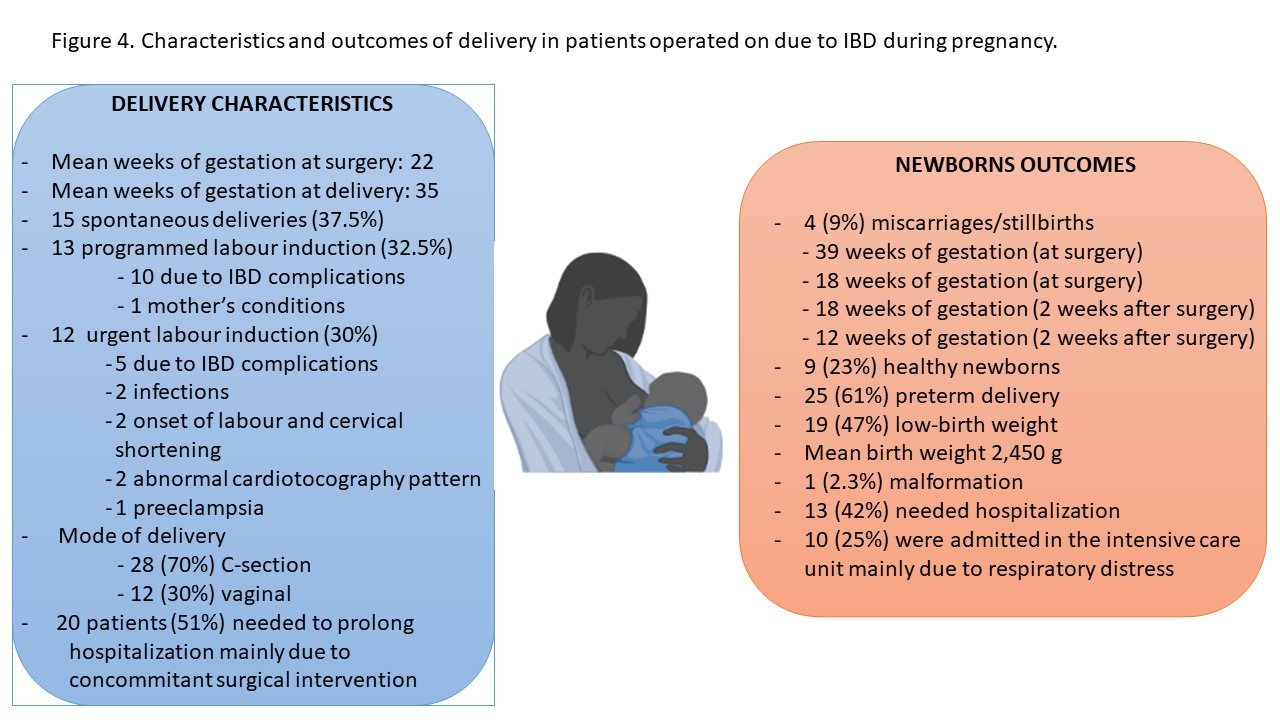P487 Surgery due to inflammatory bowel disease during pregnancy: mothers and offspring outcomes (SCAR Study)
Chaparro, M.(1);Kunovsky, L.(2);Aguas, M.(3);Livne, M.(4);Rivière, P.(5);Bar-Gil Shitrit, A.(6);Myrelid, P.(7);Arroyo, M.(8);Barreiro-de Acosta, M.(9);Bautista, M.(10);Biancone, L.(11);Biron, I.A.(12);Boysen, T.(13);Carpio, D.(14);Castro, B.(15);Dragoni, G.(16);Ellul, P.(17);Holubar, S.D.(18);de Jorge, M.Á.(19);Leo, E.(20);Manceñido, N.(21);Moens, A.(22);Molnar, T.(23);Ramírez de la Piscina, P.(24);Ricanek, P.(25);Sebkona, L.(26);Sempere, L.(27);Teich, N.(28);Gisbert, J.P.(1);Julsgaard, M.(29);
(1)Hospital Universitario de La Princesa- Instituto de Investigación Sanitaria Princesa IIS-IP- Universidad Autónoma de Madrid- and Centro de Investigación Biomédica en Red de Enfermedades Hepáticas y Digestivas CIBERehd, Gastroenterology Unit, Madrid, Spain;(2)University Hospital Brno, Department of Surgery, Masaryk University, Faculty of Medicine, Brno, Czech Republic;(3)Hospital Universitario y Politécnico La Fe and CIBERehd, Gastroenterology Unit, Valencia, Spain;(4)Sheba Medical Center, Gastroenterology Unit, Tel Hashomer, Israel;(5)Bordeaux University Hospitals, Gastroenterology Unit, Bordeaux, France;(6)Shaare Zedek Medical Center, Gastroenterology Unit, Jerusalem, Israel;(7)Linköping University Hospital and Department of Biomedical and Clinical Sciences- Linköping University, Surgery, Linköping, Sweden;(8)Hospital Clínico Universitario Lozano Blesa- CIBERehd and IIS Aragón, Gastroenterology Unit, Zaragoza, Spain;(9)Complejo Hospitalario Universitario de Santiago, Gastroenterology Unit, Santiago de Compostela, Spain;(10)Hospital Joan XXIII, Gastroenterology Unit, Tarragona, Spain;(11)University of Rome “Tor Vergata”, Gastroenterology Unit, Rome, Italy;(12)IBD center, Gastroenterology Division, Rabin medical center, Petach Tikva, Israel;(13)Hvidovre University Hospital, Gastroenterology Unit, Hvidovre, Denmark;(14)Complexo Hospitalario Universitario de Pontevedra- Instituto de Investigación Sanitaria Galicia Sur, Gastroenterology Unit, Pontevedra, Spain;(15)Hospital Universitario Marqués de Valdecilla and IDIVAL, Gastroenterology Unit, Santander, Spain;(16)Careggi University Hospital, Gastroenterology Unit, Florence, Italy;(17)Mater Dei Hospital, Gastroenterology Unit, Msida, Malta;(18)Cleveland Clinic Foundation, Gastroenterology Unit, Cleveland, United States;(19)Hospital de Cabueñes, Gastroenterology Unit, Gijón, Spain;(20)Hospital Universitario Virgen del Rocío, Gastroenterology Unit, Sevilla, Spain;(21)Hospital Universitario Infanta Sofía, Gastroenterology Unit, San Sebastián de los Reyes, Spain;(22)University hospitals Leuven, Gastroenterology Unit, Leuven, Belgium;(23)University of Szeged, Albert Szent-Györgyi Medical School, Department of Internal Medicine, Szeged, Hungary;(24)Hospital Universitario de Araba sede Txagorritxu y sede Santiago, Gastroenterology Unit, Álava, Spain;(25)Akershus universitetssykehus, Gastroenterology Unit, Ski, Norway;(26)Azieda Opedaliera Pluguiese-Ciaccio, Gastroenterology Unit, Catanzaro, Italy;(27)Hospital General Universitario de Alicante and CIBERehd, Gastroenterology Unit, Alicante, Spain;(28)Practice for internal medicine, Gastroenterology Unit, Leipzig, Germany;(29)Aarhus University Hospital, Gastroenterology Unit, Aarhus, Denmark; on behalf of the ECCO CONFER taskforce
Background
Data on the outcomes of surgery due to IBD in pregnant patients is scarce, and primarily dates back more than 3 decades ago. Primary aim: to evaluate the evolution of pregnancies and offspring after surgery due to IBD. Secondary aims: to describe the indications for surgery, the surgical techniques used, and the frequency of caesarean section concomitant to surgery for IBD
Methods
SCAR is a retrospective, multicenter study approved by ECCO COllaborative Network For Exceptionally Rare Case Reports (CONFER). Patients operated on due to IBD during pregnancy after 1998 (first biologic agent approved) were included. Data on patients’ demographics, IBD characteristics, medical treatments, IBD activity, pregnancy outcomes, surgery, delivery, foetal and maternal outcomes, were recorded
Results
44 IBD patients were included (figure 1),
all singleton pregnancies. Seven patients (16%) were diagnosed with IBD during pregnancy, 75% had Crohn’s disease (51% fistulizing behavior), and 23% had ulcerative colitis. 34% had previously undergone surgery due to IBD. Several complementary examinations were performed during pregnancy without complications (figure 2)
Patients were being administered the following medications: corticosteroids (61%), biologicals (57%), thiopurines (23%) with 20% being on biologics and thiopurines. 93% of surgeries were performed in University hospitals, (2nd Trimester: 55%; 3rd trimester: 27%) with 77% of them being urgent surgeries (figure 3)
One patient had hemoperitoneum during surgery, and 27% had postsurgical complications. No woman died. 62.5% of deliveries were induced (figure 4),
70% of them by C-section, with 51% of mothers having a prolonged hospitalization. There were 40 newborns alive and 4 miscarriages/stillbirths (1 in the 1st, 2 in the 2nd, and 1 in the 3rd trimester): 2 occurred during surgery and 2 occurred 2 weeks after surgery. 14% of the surgeries during the 2nd trimester and 64% of those in the 3rd trimester ended up with a simultaneous C-section or delivery. Of the 40 newborns alive, there were 9 healthy (24%), 61% premature, and 47% with low birth weight. A total of 42% of newborns needed hospitalization (25% in the intensive care unit, mainly due to respiratory distress)
Conclusion
The need for surgery for IBD during pregnancy remains an extremely serious situation. Maternal and foetal mortality are lower than previously described, most likely due to better supporting care. However, even in the current years, 30% of the mothers and 80% of newborns have complications, and 25% of the offspring need admission to the intensive care unit. Therefore, surgical management should be performed by a multidisciplinary team, involving gastroenterologists, colorectal surgeons, obstetricians and neonatal specialists.


